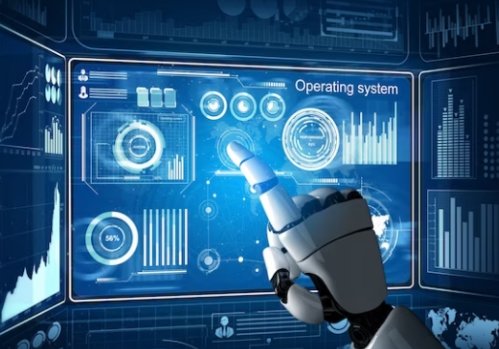
Do you know what Blockchain Oracles are? We want to know your opinion about it
The distributed ledger technology of blockchain is reshaping the ways in which we transact business and share knowledge. It's not perfect, though. Obtaining external data that can be trusted and integrated into the blockchain presents a significant challenge. This is where blockchain oracles can be of assistance.
Blockchain oracles act as intermediaries between the distributed ledger and the physical world. It's a piece of software that links the blockchain to other data stores and networks like the web, sensors, and more. Blockchain oracles are designed to answer questions that the blockchain itself cannot answer.

Imagine you want to build a decentralized app (dApp) that uses current weather reports. A blockchain oracle could be used to retrieve weather data from a reliable source and add it to the blockchain. This would make the weather data ideal for use in a distributed system because it would be unalterable and completely transparent.
Supply chain management is another area where blockchain oracles can be useful. A blockchain oracle could help a business monitor inventory as it is shipped and delivered in real time. The oracle could collect information from mobile devices and other sources, such as sensors on ships and airplanes, and then add that information to the distributed ledger. If everyone in the supply chain had access to the same data, it would increase trust and safety throughout the system.
Put simply, an oracle on the blockchain is an essential part of the whole system. It paves the way for the development of decentralized applications that are both transparent and tamper-proof by allowing external data to be brought onto the blockchain in a secure and trustworthy manner.
In my opinion, blockchain Oracles are a vital component in expanding the scope of blockchain's applications. Oracles allow developers to build decentralized applications that interact with the real world by providing a trustworthy method of bringing external data onto the blockchain. Many sectors could benefit from this, including healthcare, supply chain management, and the financial sector.
However, there are restrictions on how blockchain oracles can be used. A major issue is the safety and trustworthiness of the third-party data feeds that oracles must rely on. The trustworthiness of the whole blockchain can be jeopardized if the data source has been tampered with or provides false information. In addition, the decentralization benefits of blockchain technology are at risk if a small number of oracles come to dominate the network. Hence, to ensure a reasonable quantity of usefulness, it should be used with caution.
What are the types of Oracles
The most common type of oracle is software, which consists of computer programs that link third-party data sources to the blockchain. Data is retrieved from a predetermined source, cleaned up, and then added to the blockchain by way of these oracles. If you wanted to build a decentralized app that relied on up-to-the-minute weather reports, you could consult a software oracle to retrieve the reports from a reliable source and then add them to the distributed ledger.
In contrast, hardware oracles use actual sensors or devices to gather information from the real world and add it to the blockchain. Supply chain management and critical infrastructure monitoring are two examples of fields where this kind of oracle is commonly employed. A hardware oracle could be used to monitor the humidity and temperature of a shipping container holding perishable goods to guarantee their safe arrival.
Overall, the needs of a given application will determine which type of oracle is ideal. While hardware oracles offer higher levels of security and dependability, they can be more difficult and expensive to set up than their software counterparts.
Blockchains with a centralized oracle depend on a central authority to supply data to the network. An individual, group, or company could fit this description. An exchange for virtual currencies, for instance, might rely on data from a centrally located oracle to determine market rates. In this scenario, only one reliable data provider would be used to supply the exchange with up-to-date pricing data.
The difficulty with relying on a single source of information is that it may be subject to control by the powerful, censorship, and other forms of interference. The information published on the blockchain may be inaccurate or unreliable if the integrity of the central entity providing the data has been breached or corrupted. In addition, a single point of failure can be introduced by relying on a central oracle; if the oracle goes down, the entire system could be compromised.

Conversely, decentralized blockchain oracles rely on a distributed network of data providers to add information to the blockchain. A consensus mechanism is used to guarantee that the data provided by the vast majority of sources is trustworthy. You could use a distributed oracle to monitor the conditions inside a shipping container housing perishable goods, for instance. In such a scenario, the data could come from a variety of sources, including sensors and devices, before being checked and validated by the network.
Unlike centralized oracles, which can be easily manipulated or censored, distributed ones can function with little to no outside influence. Since the data comes from multiple, unrelated sources, the system is more secure and reliable overall. Since anyone can join the network and check the veracity of the data being published onto the blockchain, decentralized oracles also increase trustworthiness.
While centralized oracles may be easier to implement, decentralized oracles have several advantages that make them the better option for most blockchain applications.
What do you think about decentralized oracle
Compared to centralized oracles, decentralized blockchain oracles are intended to be more reliable, trustworthy, and secure. The key distinction is that they use a decentralized network of data providers to feed blockchains with information. This is accomplished via a consensus mechanism, where the vast majority of data providers must concur on the accuracy and reliability of the data before it is added to the blockchain.
Decentralized blockchain oracles have the advantage of being resistant to tampering, censorship, and other forms of external interference. There is no single point of failure and greater security because the data is sourced from a network of independent providers. The data published by decentralized oracles on the blockchain can be independently verified by any member of the network, making them more open and trustworthy.
In contrast, centralized oracles place all their trust in a single entity; this makes them susceptible to censorship and manipulation. Software oracles may be easier to implement but may be less secure and reliable than their hardware counterparts, which rely on physical sensors or devices.
General, decentralized blockchain oracles are a significant development that could lead to novel uses of the blockchain. They are preferable to centralized oracles in most use cases of blockchain technology because they are more secure, transparent, and resilient. As with any technological advancement, however, their proper application is essential for realizing their potential and mitigating any potential risks.
Give us a use case of decentralized oracle
Here is an example of a real-world application of a decentralized oracle system.
Suppose you're a farmer who's interested in using a blockchain-based platform to sell your produce directly to consumers. Obtaining up-to-the-minute market information is essential if you want to set a reasonable and competitive price.
One company might be responsible for providing this information in a centralized system, making it more susceptible to manipulation or other forms of interference. As an alternative, a decentralized oracle would allow you to tap into a web of disparate data sources to obtain the most trustworthy market information possible.
You could, for instance, create a decentralized oracle that aggregates information from various markets and suppliers in your area, such as farmer's markets and cooperatives. The network would compile and validate the information, giving you confidence that the price you're quoting is reasonable.
Using a decentralized oracle removes the potential for a single point of failure or vulnerability, leading to more trustworthy market data. If you do this, you can earn your customers' trust and strengthen the agricultural industry as a whole.
In conclusion, the Blockchain oracle is worth having by every business and the idea is to improve, security, transparency and efficiency.
Am inviting @mm-writes, @joelmartins and @simonnwigwe to join this contest 😀
Dear @cinnymartins you have explained very well about blockchain oracles and i just visited your blog and i got so much information from your it's really interesting.Yes brother you're right blockchain oracles act as intermediate between distributed ledger and the real world and the blockchain oracles has been designed to give the answers of the questions that blockchain can't do itself.You explained really good about blockchain oracles and your searched about blockchain oracles is really appreciating.
Dear friend you shared your searched and your thoughts about the types of blockchain oracles is really well and good.You are right software oracles is a computer software that connect the blockchain with third party data and also you mentioned good about the hardware oracles and the centralized oracle.You share some good words about decenterlizied oracles and you're right that decentralized oracles rely on distributed network of data provider.
Your thoughts about decenterlizied oracles is correct and these are more reliable and correct that centralized oracles and decentralized oracles are the advantage to more consistent.You explained very well about the use of decentralized oracles with the example of farmer that can used blockchain network.Overall, you'r blog is really informative and i wish you good luck for the contest.
Downvoting a post can decrease pending rewards and make it less visible. Common reasons:
Submit
Dear @azmat545, thanks for your comment. Shows you took out time to go through
Downvoting a post can decrease pending rewards and make it less visible. Common reasons:
Submit
Your post has been supported by @simonnwigwe from Team 2 of the Community Curation Program, at 30%. We invite you to continue sharing quality content on the platform, and continue to enjoy support, and also a likely spot in our weekly top 7.
Downvoting a post can decrease pending rewards and make it less visible. Common reasons:
Submit
Greetings @cinnymartins, how are you? Happy to see you are taking part in the contest.
Blockchain oracles are intermediate between real world assets and blockchain world. It helps to transfer information from real world to smart contracts in order to execute them. They are very useful in this era.
You have strong grip on blockchain oracles which can be seen through your post. You have also explained the types of it.
Moreover, you have also explained the decentralization of oracles and use case.
I suggest one thing if you dont mind and take it in positive way. That is add points because it makes the layout 100% perfect and you will get highest score because your content is great just need a little layout work and then no one can beat you in this contest.
However, thank you for sharing with us. I wish you success in this as well as all other contests. Stay Blessed and motivated :)
Downvoting a post can decrease pending rewards and make it less visible. Common reasons:
Submit
Heyyy,
Thanks a lot. I appreciate and accept your correction friend
Downvoting a post can decrease pending rewards and make it less visible. Common reasons:
Submit
My Pleasure :)
Downvoting a post can decrease pending rewards and make it less visible. Common reasons:
Submit
You pointed it right. Besides softwares , oracles can be hardwares too like sensors ( as you mentioned) which can be used for multiple purposes like weather , polls etc.
Yes that's right . You have mentioned multiple use cases of oracles w.r.t blockchains . So oracles have diversified the scope of blockchain's and made increased its interoperability as well.
I do agree with your opinion. They may be having a steep learning curve compared to software oracles.
Decentralized oracles rely on a distributed network of data providers to add information to the blockchain, making them more secure and reliable than centralized oracles.
Good luck
Downvoting a post can decrease pending rewards and make it less visible. Common reasons:
Submit
Greetings
You have described in very detail about the blockchain oracles how they act as a bridge for connection of data from contract to real outside World.
You have explained the drawbacks in very detailed.
I am agree we must know its drawback too. Yeah definitely decentralized oracles jas alot of advanced features and benefits over the centralized oracles which has certainly issues of limitations.
Hence after reading this i may clear why blockchain oracles and decentralized becoming much popular in the World.
Keep sharing valuable information.
Best wishes
Downvoting a post can decrease pending rewards and make it less visible. Common reasons:
Submit